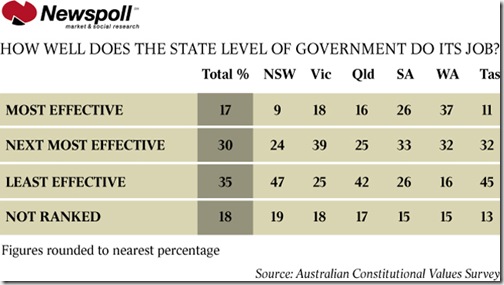 The Australian carried an interesting story reporting on the results of a survey on attitudes towards the various levels of Government and associated issues of constitutional change.
The Australian carried an interesting story reporting on the results of a survey on attitudes towards the various levels of Government and associated issues of constitutional change.
Overall, 75 per cent favour reform of the present system - nine points up on 2008. Although there is no consensus on what should change, 42 per cent are attracted to the idea of regional governments, which would be bigger than local councils but smaller than state governments.
I find it interesting that two (NSW and Queensland) of the three states ranked lowest in performance terms are also those states that have had traditionally the strongest new state movements.
While the figures are all over the place and continue to indicate the difficulty of bringing about constitutional change, they also suggest a growing willingness to actually discuss change.
Traditionally, those who have supported new states have also supported constitutional reform. However, they have also had two concerns.
The first is the size of the proposed states. Too small, and their capacity to actually do things will be constrained. Too large, and we get the NSW/Queensland problem repeated.
The second are the powers and finances to be attached to those states. Because one of the traditional drivers for new state support has been the constant willingness of Sydney, Brisbane or Canberra to override local and regional interests whenever it suited them, new staters want new states with constitutionally protected powers rather than regional councils with devolved powers that can be removed or overridden at any time.
Over its long history, the New England New State Movement played a major role in constitutional debate. At state level, we have the Cohen and Nicholas Royal Commissions. At Federal level, the Movement forced the creation of the Peden Royal Commission and then, later, the Commonwealth Parliamentary Inquiry into the Constitution.
All this means that most of the issues we are dealing with now have been thrashed out at considerable length, with New England history and thought forming a distinct and important thread.
I know that constitutional history and issues can be pretty eye-glazing stuff. Yet if we don't take into account past thought and arguments, we are highly likely to get worst possible outcomes.












No comments:
Post a Comment